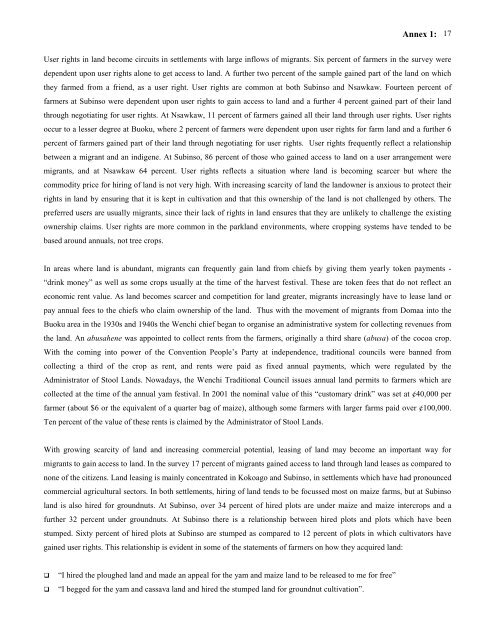Poverty Dimensions of Public Governance and Forest Management ...
Poverty Dimensions of Public Governance and Forest Management ...
Poverty Dimensions of Public Governance and Forest Management ...
You also want an ePaper? Increase the reach of your titles
YUMPU automatically turns print PDFs into web optimized ePapers that Google loves.
Annex 1: 17<br />
User rights in l<strong>and</strong> become circuits in settlements with large inflows <strong>of</strong> migrants. Six percent <strong>of</strong> farmers in the survey were<br />
dependent upon user rights alone to get access to l<strong>and</strong>. A further two percent <strong>of</strong> the sample gained part <strong>of</strong> the l<strong>and</strong> on which<br />
they farmed from a friend, as a user right. User rights are common at both Subinso <strong>and</strong> Nsawkaw. Fourteen percent <strong>of</strong><br />
farmers at Subinso were dependent upon user rights to gain access to l<strong>and</strong> <strong>and</strong> a further 4 percent gained part <strong>of</strong> their l<strong>and</strong><br />
through negotiating for user rights. At Nsawkaw, 11 percent <strong>of</strong> farmers gained all their l<strong>and</strong> through user rights. User rights<br />
occur to a lesser degree at Buoku, where 2 percent <strong>of</strong> farmers were dependent upon user rights for farm l<strong>and</strong> <strong>and</strong> a further 6<br />
percent <strong>of</strong> farmers gained part <strong>of</strong> their l<strong>and</strong> through negotiating for user rights. User rights frequently reflect a relationship<br />
between a migrant <strong>and</strong> an indigene. At Subinso, 86 percent <strong>of</strong> those who gained access to l<strong>and</strong> on a user arrangement were<br />
migrants, <strong>and</strong> at Nsawkaw 64 percent. User rights reflects a situation where l<strong>and</strong> is becoming scarcer but where the<br />
commodity price for hiring <strong>of</strong> l<strong>and</strong> is not very high. With increasing scarcity <strong>of</strong> l<strong>and</strong> the l<strong>and</strong>owner is anxious to protect their<br />
rights in l<strong>and</strong> by ensuring that it is kept in cultivation <strong>and</strong> that this ownership <strong>of</strong> the l<strong>and</strong> is not challenged by others. The<br />
preferred users are usually migrants, since their lack <strong>of</strong> rights in l<strong>and</strong> ensures that they are unlikely to challenge the existing<br />
ownership claims. User rights are more common in the parkl<strong>and</strong> environments, where cropping systems have tended to be<br />
based around annuals, not tree crops.<br />
In areas where l<strong>and</strong> is abundant, migrants can frequently gain l<strong>and</strong> from chiefs by giving them yearly token payments -<br />
“drink money” as well as some crops usually at the time <strong>of</strong> the harvest festival. These are token fees that do not reflect an<br />
economic rent value. As l<strong>and</strong> becomes scarcer <strong>and</strong> competition for l<strong>and</strong> greater, migrants increasingly have to lease l<strong>and</strong> or<br />
pay annual fees to the chiefs who claim ownership <strong>of</strong> the l<strong>and</strong>. Thus with the movement <strong>of</strong> migrants from Domaa into the<br />
Buoku area in the 1930s <strong>and</strong> 1940s the Wenchi chief began to organise an administrative system for collecting revenues from<br />
the l<strong>and</strong>. An abusahene was appointed to collect rents from the farmers, originally a third share (abusa) <strong>of</strong> the cocoa crop.<br />
With the coming into power <strong>of</strong> the Convention People’s Party at independence, traditional councils were banned from<br />
collecting a third <strong>of</strong> the crop as rent, <strong>and</strong> rents were paid as fixed annual payments, which were regulated by the<br />
Administrator <strong>of</strong> Stool L<strong>and</strong>s. Nowadays, the Wenchi Traditional Council issues annual l<strong>and</strong> permits to farmers which are<br />
collected at the time <strong>of</strong> the annual yam festival. In 2001 the nominal value <strong>of</strong> this “customary drink” was set at ¢40,000 per<br />
farmer (about $6 or the equivalent <strong>of</strong> a quarter bag <strong>of</strong> maize), although some farmers with larger farms paid over ¢100,000.<br />
Ten percent <strong>of</strong> the value <strong>of</strong> these rents is claimed by the Administrator <strong>of</strong> Stool L<strong>and</strong>s.<br />
With growing scarcity <strong>of</strong> l<strong>and</strong> <strong>and</strong> increasing commercial potential, leasing <strong>of</strong> l<strong>and</strong> may become an important way for<br />
migrants to gain access to l<strong>and</strong>. In the survey 17 percent <strong>of</strong> migrants gained access to l<strong>and</strong> through l<strong>and</strong> leases as compared to<br />
none <strong>of</strong> the citizens. L<strong>and</strong> leasing is mainly concentrated in Kokoago <strong>and</strong> Subinso, in settlements which have had pronounced<br />
commercial agricultural sectors. In both settlements, hiring <strong>of</strong> l<strong>and</strong> tends to be focussed most on maize farms, but at Subinso<br />
l<strong>and</strong> is also hired for groundnuts. At Subinso, over 34 percent <strong>of</strong> hired plots are under maize <strong>and</strong> maize intercrops <strong>and</strong> a<br />
further 32 percent under groundnuts. At Subinso there is a relationship between hired plots <strong>and</strong> plots which have been<br />
stumped. Sixty percent <strong>of</strong> hired plots at Subinso are stumped as compared to 12 percent <strong>of</strong> plots in which cultivators have<br />
gained user rights. This relationship is evident in some <strong>of</strong> the statements <strong>of</strong> farmers on how they acquired l<strong>and</strong>:<br />
" “I hired the ploughed l<strong>and</strong> <strong>and</strong> made an appeal for the yam <strong>and</strong> maize l<strong>and</strong> to be released to me for free”<br />
" “I begged for the yam <strong>and</strong> cassava l<strong>and</strong> <strong>and</strong> hired the stumped l<strong>and</strong> for groundnut cultivation”.
















